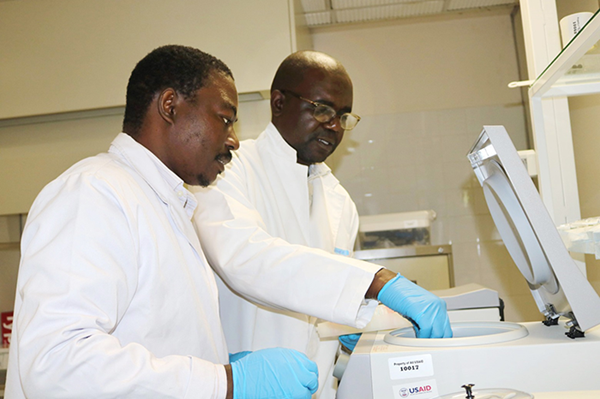Africa University is engaged in groundbreaking research to combat malaria in partnership with the U.S. Agency for International Development, the Zimbabwe government Ministry of Health and Child Care and other organizations.
Your support of the Africa University Fund apportionment supports the general operating expenses of Africa University including faculty and staff salaries and vital infrastructure.
The work to study mosquitos that cause malaria is part of a broader effort by the U.S. President's Malaria Initiative, a project of USAID and the Centers for Disease Control and Prevention to increase the capacity of mosquito monitoring and research throughout Zimbabwe, said Stephanie Funk, USAID/Zimbabwe mission director.
"Africa University's lab and insectary, located in a part of the country with the highest cases of malaria, will help map malaria mosquitoes throughout the country, monitor and understand mechanisms for mosquito resistance to insecticides, and document mosquito biting and resting behaviors," said Funk.
She said the U.S. initiative supports Zimbabwe's national malaria program by providing bed nets, spraying to eliminate mosquitoes and assisting in diagnosis and treatment to combat malaria in 45 districts.
"This contributed to the reduction in malaria cases from 1.8 million in 2006 to 469,000 in 2017," she said.
Sungano Mharakurwa, a professor at Africa University, said that until 2015, malaria was the leading cause of death in Zimbabwe, even surpassing HIV/AIDS. "But thanks to increased interventions and renewed determination to eradicate the disease, the problem has been greatly reduced," he said.
Until three years ago, the annual global malaria death toll was 2 million — mostly children in Africa — with 500 million suffering from the disease every year, Mharakurwa said.
In 2011 there was a massive effort to spray homes for mosquitos but the number of cases increased instead of decreased. It was discovered that the Anopheles funestus mosquito, a species thought to be extinct was alive and well and resistant to the synthetic pyrethroid insecticides used for both residual spraying in households and treating mosquito nets.
"The Ministry of Health then changed the malaria policy in 2014, resulting in the introduction of a different class of chemicals for spraying," Mharakurwa explained.
The university now provides the government with reference material and live mosquito specimens and is in the final stages of establishing a national referencing insectary for research.
Currently, the government's malaria control program personnel submit suspected malaria-transmitting mosquitoes to the university, which dissects and analyzes the specimen in its laboratories.
"We are now working on more versatile personal protection and researching on effective natural methods traditionally used to fight the disease," Mharakurwa said.
Mharakurwa said the research will benefit other countries besides Zimbabwe. "The methods and research findings are shared across the Southern Africa region and beyond."
Eveline Chikwanah, communicator of the Zimbabwe East Annual Conference.
One of seven apportioned giving opportunities of The United Methodist Church, the Africa University Fund transforms Africa by educating and empowering students from across the continent through Africa University, the first fully accredited, United Methodist-related educational institution on the continent. The Africa University Fund supports the general operating expenses of Africa University including faculty and staff salaries and vital infrastructure. Please encourage your leaders and congregations to support the Africa University Fund at 100 percent.





